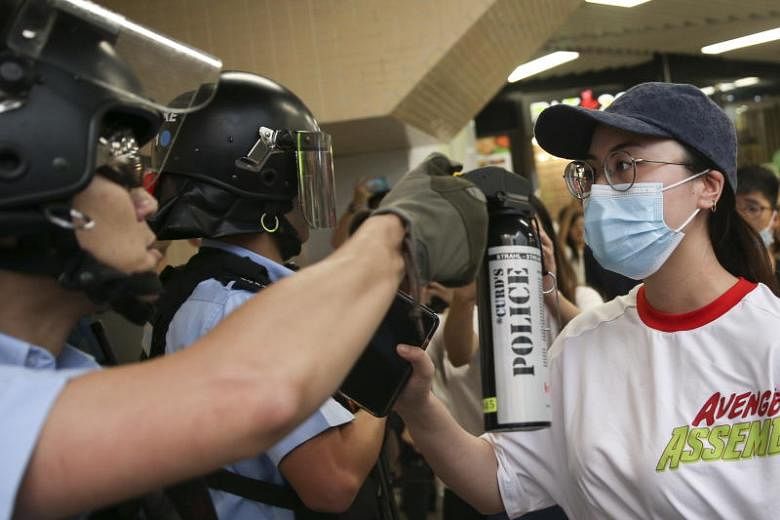HONG KONG (REUTERS, AP, AFP) - Baton-wielding Hong Kong police moved in to break up scuffles on Saturday (Sept 14) between pro-China protesters and those denouncing perceived Chinese meddling at the start of rallies planned for across the city after months of often violent unrest.
The pro-China demonstrators chanted "Support the police" and "China, add oil" at Amoy Plaza, a shopping mall in the Kowloon Bay area, adapting a line used by anti-Hong Kong government protesters and loosely meaning: "China, keep your strength up".
"Hong Kong is China," one woman shouted at passersby who shouted obscenities in return in an angry pushing and pulling standoff, marked more by the shouting than violence.
The clashes in the Kowloon Bay area of the Hong Kong "special administrative zone" of China spilled out onto the streets, with each confrontation captured by dozens of media and onlookers on their smart phones. Police detained several people.
But the unrest was minor compared with previous weeks when anti-government protesters have attacked the legislature and Liaison Office, the symbol of Chinese rule, trashed metro stations and set street fires. Police have responded with tear gas, rubber bullets and water cannon.
Protesters complaining about perceived Chinese interference in the former British colony came out in their hundreds across the territory on Friday (Sept 13), singing and chanting on the Mid-Autumn Festival.
They have also gathered in malls, with occasional scuffles with flag-carrying China supporters, often denouncing police for perceived brutality.
SCUFFLES ELSEWHERE
On Saturday, hundreds of anti-government protesters also gathered in the northwestern New Territories district of Tin Shui Wai, with a brief standoff with police. There were scattered scuffles between rival protesters elsewhere, including in the Fortress Hill area of Hong Kong island.
"We need to keep coming out to tell the government to respond to our five demands, otherwise it will think we accept the withdrawal (of an extradition Bill)," said protester Mandy, 26, in Tin Shui Wai, where crowds, a few waving the US Stars and Stripes, shouted: "Liberate Hong Kong."
In the district of Fortress Hill, a group of men, many waving Chinese flags and wearing blue t-shirts declaring "I love HK police", attacked people perceived to be pro-democracy protesters.

Multiple videos posted online showed the group of men assaulting largely younger victims with large flags on poles - and with punches and kicks - as terrified onlookers ran away.
Fortress Hill is next to North Point, an area of the city where similar mob attacks by government supporters have occurred this summer and which has long been a bastion of pro-Beijing sentiment.
Some 200 high school students staged a sit-in on Saturday at a public square in the city's Central district. Many students have formed human chains outside their schools as classes resumed two weeks ago after the summer break.
"Many students feel angry and unhappy. Today's gathering is a platform for us to vent our frustrations," said Lia Ng, 14.
The spark for the protests was a now-withdrawn extradition Bill and concerns that Beijing is eroding civil liberties, but many young protesters are also angry about sky-high living costs and a lack of job prospects.
Their four other demands are: retraction of the word "riot"to describe rallies, release of all detained demonstrators, an independent inquiry into perceived police brutality and the right for Hong Kong people to choose their own leaders.
The demonstrations started in June in response to a Bill that would have allowed people to be sent to mainland China for trial in Communist Party-controlled courts, but have broadened into calls for greater democracy.
Hong Kong returned to China under a "one country, two systems" formula that guarantees freedoms not enjoyed on the mainland - including a much-cherished independent legal system.
China says Hong Kong is now its internal affair. It says it is committed to the "one country, two systems" arrangement and denies meddling in Hong Kong's affairs.
China is eager to quell the unrest before the 70th anniversary of the founding of the People's Republic of China on Oct 1. It has accused foreign powers, particularly the United States and Britain, of fomenting the unrest.
Britain says it has a legal responsibility to ensure China abides by its obligations under the 1984 declaration.
"The Joint Declaration is a legally binding treaty between the UK and China that remains as valid today as it was when it was signed and ratified over 30 years ago," a British Foreign Office spokesman said in June.
"As a co-signatory, the UK government will continue to defend our position."
But there is little London can do to force Beijing's hand, pinning its hopes on closer trade and investment cooperation with the world's second-largest economy after Britain leaves the European Union as planned at the end of next month.
The Communist Party said in a commentary on social media on Friday that Hong Kong protesters should not turn to the West to resolve their problems.
The party's Central Political and Legal Affairs Commission said high housing costs, lack of jobs and other issues sparked their grievances and that young people should "look north" to opportunities in mainland China.
"The way out is not in the West," the commentary said.
"Where 'democracy' and 'freedom' are brought in with the West's help, there is scorched earth," it said, adding that expecting Western countries to solve distant problems "can only be a fantasy story."
"The way out really is at home," it added.













